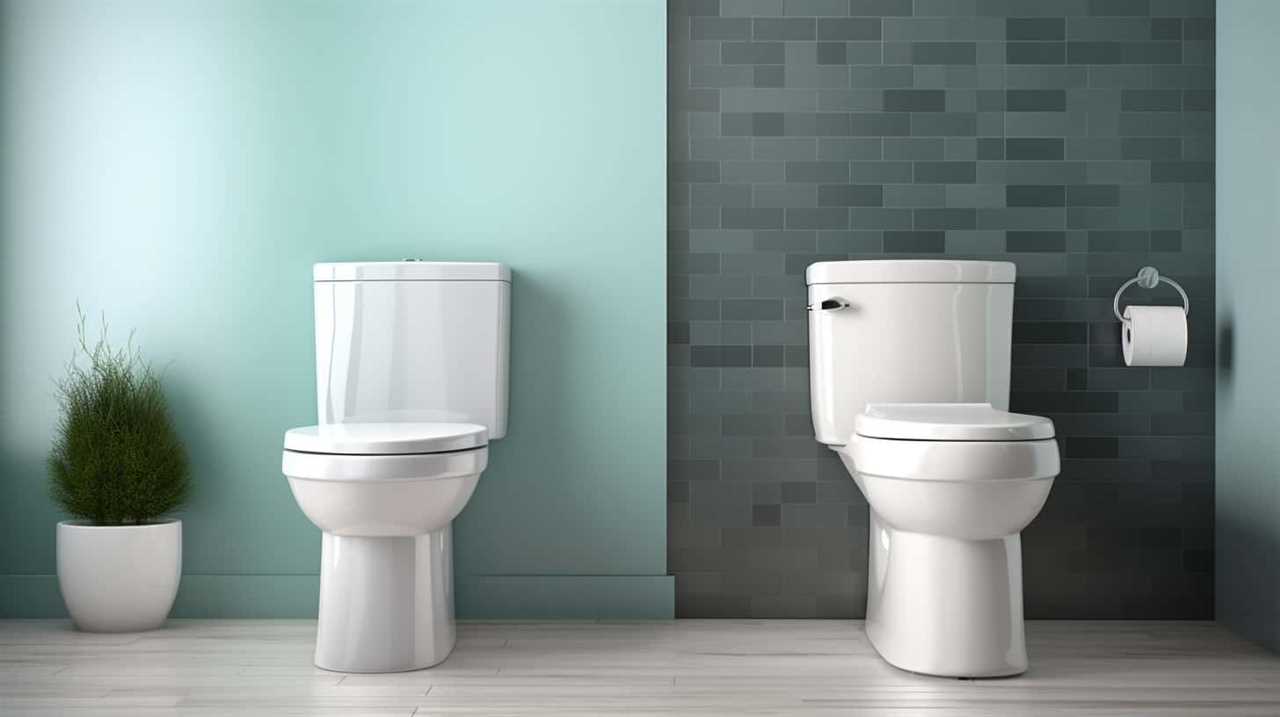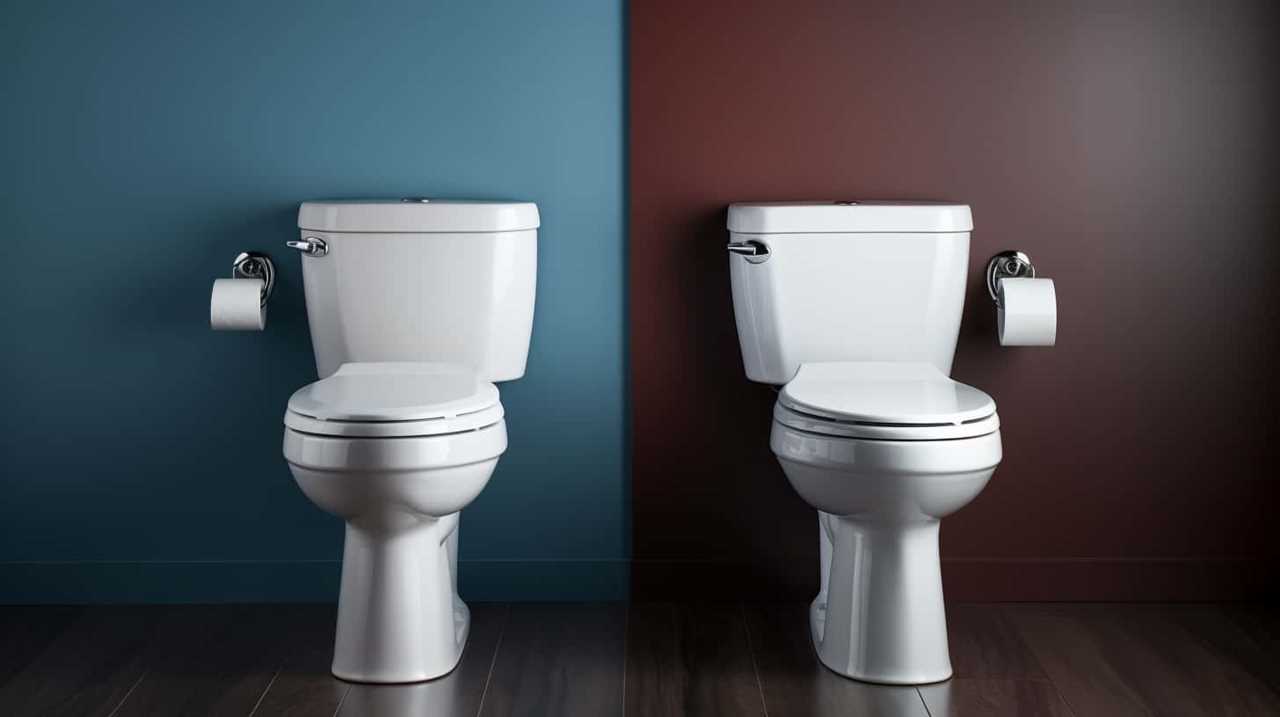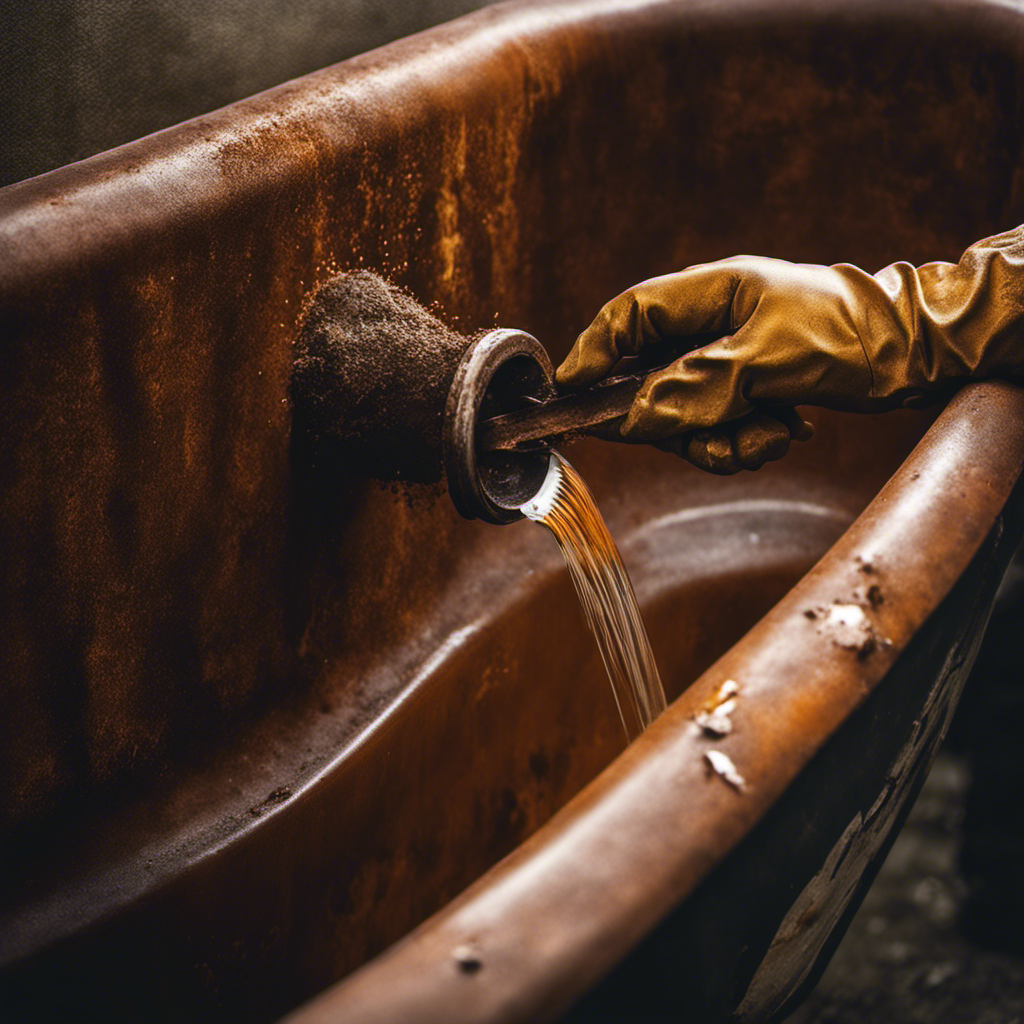In preserving the well-being of our septic system, it’s crucial that we make careful decisions. There’s truth in the adage, ‘Better to prevent than to heal.’
In this article, we will explore the importance of using toilet cleaners that are safe for septic systems. By understanding the impact of harsh chemicals, seeking out natural ingredients, and avoiding antibacterial agents, we can ensure the pH balance and overall health of our septic system.
Stay tuned for our recommendations on the best toilet cleaners for septic systems.
Key Takeaways
- Harsh chemicals disrupt waste breakdown in septic systems and can lead to clogs and backups.
- Natural ingredients like vinegar, baking soda, and essential oils are safe and effective for cleaning toilets without harming the septic system.
- Avoid antibacterial agents in toilet cleaners as they can harm beneficial bacteria and potentially cause system failure.
- Maintaining proper pH balance in the septic system is crucial for preventing the growth of harmful bacteria and ensuring efficient waste breakdown.
Understanding the Impact of Harsh Chemicals
To truly understand the impact of harsh chemicals on a septic system, we must delve into the ways these substances can adversely affect its delicate balance.

Harsh chemicals, commonly found in commercial toilet cleaners, can disrupt the natural process of waste breakdown in a septic system. These chemicals can kill the beneficial bacteria that are responsible for breaking down solid waste and maintaining the overall health of the septic tank.
The imbalance caused by harsh chemicals can lead to clogs, backups, and costly repairs. As a result, many homeowners are seeking chemical-free alternatives and turning to DIY toilet cleaner recipes.
These alternatives utilize natural ingredients such as baking soda, vinegar, and essential oils to effectively clean toilets without harming the septic system. By choosing chemical-free options, homeowners can maintain a healthy septic system and avoid the negative consequences of harsh chemicals.
Natural Ingredients to Look for in Toilet Cleaners
We can find natural ingredients in toilet cleaners that are safe for septic systems. When looking for eco-friendly options or considering DIY toilet cleaning solutions, it’s important to choose products that are gentle on both the environment and your septic system.

Here are three natural ingredients to look for in toilet cleaners:
- Vinegar: Known for its disinfecting properties, vinegar can effectively remove stains and odors from toilets. It’s a mild acid that helps break down mineral deposits and kill bacteria.
- Baking soda: This versatile ingredient is great for cleaning toilets as it acts as a gentle abrasive. Baking soda can help remove tough stains without scratching the surface.
- Essential oils: Not only do essential oils add a pleasant scent to your toilet, but they also possess antimicrobial properties. Tea tree oil, lavender oil, or lemon oil are popular choices for their cleaning and freshening abilities.
Avoiding Antibacterial Agents in Toilet Cleaners
When it comes to maintaining a clean and well-functioning septic system, it’s important to steer clear of antibacterial agents in toilet cleaners. Antibacterial agents, such as triclosan and quaternary ammonium compounds, can have a negative impact on septic system health. These agents are designed to kill bacteria, but they can also harm the beneficial bacteria in the septic tank that help break down waste.
This can lead to an imbalance in the septic system, resulting in reduced efficiency and potential system failure. Thankfully, there are alternatives to antibacterial toilet cleaners that are safe for septic systems. Natural cleaners, such as vinegar, baking soda, and hydrogen peroxide, can effectively clean toilets without harming the septic system.
Ph Balance and Septic System Health
Maintaining a balanced pH is crucial for the health and functionality of our septic system. Proper pH levels in septic systems can prevent the growth of harmful bacteria and ensure the efficient breakdown of waste.

Here are some important points to consider:
- pH range: The ideal pH range for a septic system is between 6.5 and 7.5. This slightly acidic to neutral range promotes the growth of beneficial bacteria while inhibiting the growth of harmful pathogens.
- Common misconceptions: There’s a misconception that adding acidic or alkaline substances to the septic system can help regulate pH. However, this can disrupt the natural balance and harm the septic system.
- Regular testing: It’s essential to regularly test the pH levels of your septic system to ensure they remain within the optimal range. This will help maintain the system’s health and prevent costly repairs.
Recommended Toilet Cleaners for Septic Systems
To ensure the health of our septic system, it is important to use toilet cleaners that are safe and compatible with its delicate balance. When choosing a toilet cleaner for septic systems, it is essential to consider its effectiveness in cleaning and disinfecting while also being eco-friendly. Fortunately, there are several options available that meet these criteria.
| Toilet Cleaner | Effectiveness | Eco-Friendly |
|---|---|---|
| Method | High | Yes |
| Seventh Generation | Moderate | Yes |
| Ecover | Moderate | Yes |
Method toilet cleaner is known for its high effectiveness in removing stains and eliminating odors, making it a reliable choice for maintaining a clean toilet. Seventh Generation and Ecover also provide decent cleaning power while being environmentally friendly. These brands prioritize using plant-based, biodegradable ingredients that are safe for septic systems and the environment. By opting for these eco-friendly options, you can effectively clean your toilet without compromising the health of your septic system.
Frequently Asked Questions
How Often Should I Clean My Toilet to Maintain a Healthy Septic System?
To maintain a healthy septic system, we should clean our toilets regularly to prevent stains and odors. Cleaning frequency may vary based on usage, but a general guideline is to clean at least once a week. Additionally, using natural deodorizers between cleanings can help keep the toilet smelling fresh.

Can Using Harsh Chemicals in My Toilet Cleaner Cause Damage to My Septic System?
Using harsh chemicals in toilet cleaners can cause damage to septic systems. We’ve found that natural toilet cleaners have a minimal impact on septic system health. Homemade cleaners can be just as effective as commercial ones for septic system maintenance.
Are There Any Alternative Methods to Clean My Toilet Without Using Commercial Toilet Cleaners?
There are several alternative methods for cleaning toilets without commercial cleaners. DIY toilet cleaning solutions, such as baking soda and vinegar or lemon juice, can be effective and safe for septic systems.
Can Using Antibacterial Toilet Cleaners Affect the Beneficial Bacteria in My Septic Tank?
Using antibacterial toilet cleaners may impact the beneficial bacteria in our septic tank, which is crucial for septic system maintenance. We should consider alternative toilet cleaning methods or choose toilet cleaner options specifically designed for septic systems.
Is It Necessary to Use a Toilet Cleaner Specifically Labeled for Septic Systems, or Are There Other Options That Are Also Safe to Use?
Using alternative cleaning methods and eco-friendly toilet cleaners is safe for septic systems. It is not necessary to use a toilet cleaner specifically labeled for septic systems.

Conclusion
In conclusion, when it comes to choosing a toilet cleaner that’s safe for septic systems, it’s crucial to consider the impact of harsh chemicals. Opting for natural ingredients can help protect the delicate balance of the septic system. Avoiding antibacterial agents is also important, as they can disrupt the natural processes within the system. Additionally, maintaining pH balance is key to ensuring the optimal functioning of the septic system. Just like a delicate ecosystem, a septic system requires gentle care to thrive. So, choose wisely and let your toilet cleaner become the nurturing gardener for your septic system’s health.









